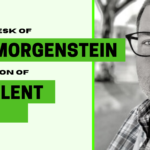The tide is turning in favor of creator pay, but is calling out brands for using allegedly plagiarized work actually helpful?
CEO Evan Morgenstein featured in NBC News article by Morgan Sung.
Designer Cecelia Monge found herself in a spat with Converse after she accused the shoe brand of using her designs, which she submitted in 2019, in its national park collection.
“I don’t think it’s a coincidence, and it’s kind of just unfortunate when larger companies ‘borrow’ from smaller designers,” Monge said in May in a TikTok video, which amassed 22.8 million views. Converse denied the accusations in a comment on a post on Diet Prada’s Instagram account.
Monge, who didn’t respond to a request for comment, and the shoe brand, which also didn’t respond to a request for comment, never partnered up.
But months later, in October, Monge was presented with a new opportunity: creating a collection of apparel using her original national park-inspired patterns in collaboration with the underwear brand Shinesty. The collection is nearly sold out.
While some creators may seek legal retribution for work they believe is stolen, few have the resources to go after well-known brands. Calling out brands online, however, is free.
And that’s why many creators, like Monge, are increasingly using social media to call out brands that they say aren’t properly crediting and compensating them.
Copyright laws regarding creative work aren’t always clear-cut, and people who post online risks their work’s being plagiarized and distributed without credit. Large companies have long had the upper hand in working with creators, especially those who have smaller platforms.
The tide is turning in favor of creator pay, but is calling out brands for using allegedly plagiarized work actually helpful?
It depends, said Evan Morgenstein, the CEO of the influencer talent agency The Digital Renegades, which manages partnerships between creators and brands.
Publicly shaming a brand may be tempting because consumers tend to trust other consumers more than they would a large company, Morgenstein said.
“Brand to consumer [marketing] is dead,” he said. “If you’re a brand, you can’t advertise to consumers anymore. It has to be consumer to consumer, which is why brands want to start in communities, and hopefully people in the communities talk the product up.”
Public snark can pay off, sometimes
Public snark can sometimes end up leading to a productive partnership, one that benefits both brand and creator.
One of the higher-profile instances occurred in 2020 with Epic Games, the parent company of the game Fortnite.
Epic Games ended up working closely with the actor Ana Coto, who went viral in early 2020 with a roller skating routine to the song “Jenny From the Block.” Coto had posted a side-by-side video of her original TikTok video from March 2020 with a clip of Fortnite’s nearly identical dance emote Freewheelin’, which was added to the game that summer.
“Flattered but no dance credit?” Coto captioned the TikTok video.
A week later, Fortnite attributed the dance as having been “inspired by” Coto, who eventually worked with the game to create another skate-themed emote.
Epic Games had been criticized in the past, and even sued, for using viral TikTok dances as in-game emotes without crediting the original creators who choreographed the dances. Although Epic Games last year began crediting emotes to creators, like “Renegade” choreographer Jaliaiah Harmon, other TikTok creators still accused Fortnite of using likenesses of their work without permission.
Now, however, the company is reported to directly pay creators to use their viral dances, and it includes attribution on the emotes’ listings in the game’s online shop, Billboard reported last year.
Coto didn’t immediately respond to a request for comment. Epic Games, which declined to comment, referred to previous comments it has made to Billboard.
“I wouldn’t say it’s a choice we’re making to correct a past mistake,” Epic Games’ head of partnerships, Nate Nanzer, told Billboard in March of the move to paying creators.
“When we were thinking about this program, honestly, it wasn’t even a question,” Nanzer said. “We were like, ‘Of course we need to compensate the creators.’ We wanted to make sure that we could tag them in the posts [and] work with these folks from a marketing perspective, as well, and make sure that we’re giving them proper credit.”
Some creators end up taking legal action
Some creators prefer to stir the pot when it comes to calling out brands.
Since it launched as an anonymous fashion account in 2014, the Instagram account Diet Prada, for example, has acted as an online whistleblower bringing attention to the injustices of the creative industry.
The account, which has 2.9 million followers, is known for shaming both luxury fashion brands and fast fashion chains for copying the work of lesser-known marginalized designers.
Diet Prada’s approach to seeking digital justice has been criticized as bordering on sensationalist and in poor taste — the account known for canceling others was canceled for criticizing Kanye West’s Yeezy collaboration with the Gap with statements referring to his controversial political stances.
The post, which Diet Prada apologized for and deleted, failed to acknowledge Mowalola Ogunlesi, the Black female designer leading the collaboration.
Diet Prada declined to comment for the story.



